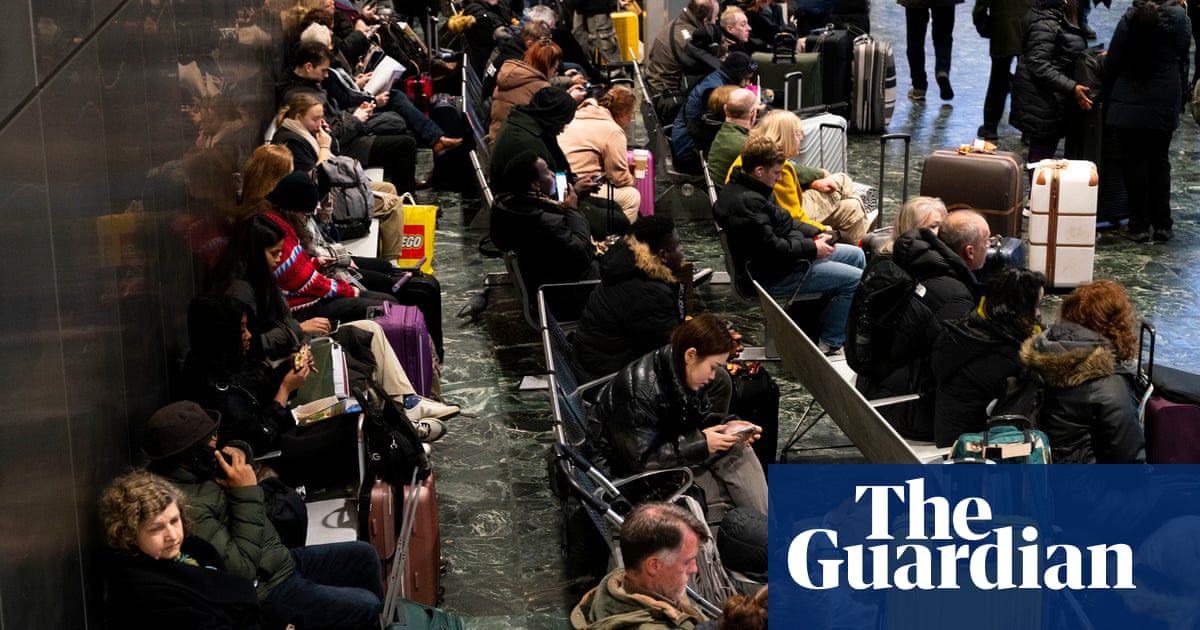Compensation payouts to UK rail passengers for delays hit £100m a year

Compensation paid to passengers for train delays in Britain has reached record levels, with annual payouts surpassing £100m and the number of claims for delayed or cancelled trains continuing to grow.
Payouts to passengers for disrupted journeys reached £101.3m in the year to April 2023 – up by 155% from £39m in 2021-22.
The latest official data from the rail regulator, the Office of Rail and Road, suggests the financial hit is likely to be much higher again in 2023-24. The number of approved claims recorded across all train operators in Britain until early January – 4.6m – exceeded the previous year’s tally with several months remaining.
While the compensation total partly reflects a rebound in train travel after the Covid crisis, the growing figures far outstrip the 40% rise in passenger numbers.
Almost 320,000 train services were cancelled or part-cancelled in the past year in Britain. Strikes, staff shortages, damaged rail infrastructure and mechanical failures on trains all contributed to a year of disruption and delayed journeys across the railways. Labour said it showed that the taxpayer was “carrying the can” for worsening rail services.
Though wholesale rail reform has been promised, under current contracts, the compensation bill is funded by the taxpayer – the government pays operators a management fee regardless of performance and carries the cost of lost revenue.
The payouts for delays covered only scheduled services, as trains that are removed from the timetable usually do not trigger compensation – a policy that has drawn huge criticism on lines such as Avanti West Coast and TransPennine Express.
The growing bill partly reflects increasing automated payouts. Some train operators now issue refunds immediately to passengers who have booked advance journeys through their websites, or to registered season ticket holders during disruption. The industry has also improved its response to complaints; more than 99% of claims are resolved within 20 days.
Labour said some of the worst operators for cancellations were being rewarded for failure. CrossCountry and Avanti West Coast’s parent companies have paid out millions to shareholders and were awarded contract extensions by ministers last year.
The shadow transport secretary, Louise Haigh, said: “Thanks to this government, it makes no difference to the management fee private rail operators receive if services are delayed or cancelled – they pick up a lucrative, publicly funded cheque regardless. It is the taxpayer forced to carry the can for our broken, dysfunctional rail network.”
after newsletter promotion
Labour has said that if elected, it will bring train operations back into public ownership as contracts expire.
A spokesperson for the Rail Delivery Group, representing train operators, said they apologised to everyone affected, adding: “When train delays or cancellations do occur, it’s important that customers know how to claim for compensation. We have taken steps to simplify this process and the ORR [Office of Rail and Road] data confirms that 99.5% of all delay compensation claims were closed within 20 working days.
“Performance on the railway is not as good as it should be. The rail industry is working hard to make trains more reliable, and we’re recruiting and training new staff to improve resilience.”
A Department for Transport spokesperson said: “This increase reflects a combination of an improved compensation claims process, Aslef’s industrial action and the impact of weather-related disruption.
“We have made no secret about the need to reform the railways and while we work with the industry to deliver our rail reform plan, we continue to hold the industry account for disruption that is within their control and to ensure value for money for taxpayers.”
Related
Why investing in women is a vital next step for…
Get Nadine White's Race Report newsletter for a fresh perspective on the week's newsGet our free newsletter from The Independent's Race CorrespondentGet our fre
Business secretary signals major shift on electric car policy to…
In a determined effort to retain Nissan’s manufacturing presence in Britain, Business Secretary Jonathan Reynolds has vowed to implement “substantial c
Joint Statement: Business Secretary and Fujitsu Services Ltd
Business and Trade Secretary Jonathan Reynolds today (Friday 7 March) met chiefs for Fujitsu in Tokyo to begin talks over the cost of redress for victims of th
UK foreign secretary backs multilateral defence funding for Europe
UK foreign secretary David Lammy has said that a new multilateral fund will be needed to secure Europe’s defence as he confirmed that Britain is “open to”













